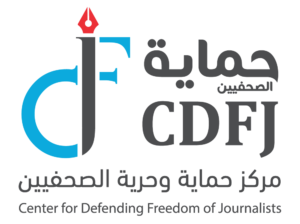
Center for Defending Freedom of Journalists Issues its Report on the State of Media Freedoms in Five Arab Countries
Center for Defending Freedom of Journalists Issues its Report on the State of Media Freedoms in Five Arab Countries
“Threatened” from its Arab Spring to its Winter, media freedoms are threatened, legislation is restrictive, and the interference and domination of governments continues
§ In Jordan, 93% of journalists practice self-censorship for fear of imprisonment, and 96% believe the government does not protect media freedom
§ 84% of Palestinian journalists believe that the government blocks the Internet, and 69% see that there are no clear and transparent declared standards for classifying information
§ 95% of Lebanese journalists believe that the government is not keen on preserving the independence of media outlets, and 73% affirmed that the security services attack journalists
§ 100% of Tunisian journalists confirm that they have been physically assaulted, and 80% affirmed that the aggressors are not prosecuted
§ 70% of Moroccan journalists confirm that the laws allow the imprisonment of journalists, 75% are subjected to violations by the Public Prosecution and/or judges, and 95% say that there are laws that protect the authority’s right to withhold information
23rd May, 2022, Center for Defending Freedom of Journalists (CDFJ) has issued a report on the state of media freedoms in the Arab world for the year 2021, entitled “Threatened”, and it included five Arab countries: Jordan, Palestine, Lebanon, Tunisia and Morocco.
The report aims to reveal the state of the media in general, its practitioners, the political, economic, and legal environments in which they work, and the extent of these environments’ impact on the media freedoms in five Arab countries.
The report concluded that media freedoms in the Arab region in general, and in the five countries in particular, are besieged, subject to restrictions in some countries, missing, and seriously threatened in others, stressing that the people of this region still need a long time until they can smell the breeze of freedom. However, this does not negate that the fight for democracy, human rights and freedom will continue.
The report emphasized that the Arab countries are relatively similar in their characteristics and challenges, pointing to what it described as the wide control of the executive authority over the juridical and legislative authorities; despite the existence of the constitutions in all “Arab countries”, their articles have been rarely respected.
The report pointed to the similarity of the economic conditions in the five countries with minor differences, in addition to the strong convergence in the legislative environment, especially in the freedom-depriving penalties in opinion cases, whether they are charges of defamation, disturbing the public peace, or other loose charges. Moreover, anti-terrorism laws came to add fuel to the fire by adding new and heavier penalties to the long list of penalties.
The report explained that some publications laws in the five countries were free of freedom-depriving penalties, but the diversity of the legal structures and the expansion of discretion makes it always possible to sentence the journalist to imprisonment; that is, instead of subjecting it to the Publications Law, it can be subjected to the Penal code, or Terrorism Law, or what is consistent with the system of laws in the country.
Regarding the law on the right to access information, the report stated that four countries, namely Jordan, Morocco, Tunisia and Lebanon, have this law, but its enforcement differs in each country, so while it faces difficulties in Jordan and Tunisia, it seems that it is soon to judge how this law is enforced in Lebanon and Morocco since the law in both countries is relatively recent. As for Palestine, it is using the Israeli occupation as an excuse to evade its responsibility to issue this law. In general, there is a “lack of transparency” in declaring the rules for accessing information, which makes the overall benefit from those laws, whatever they are, incomplete.
The report indicated that spying on cellphones, beating, prevention of coverage, and intimidation are common violations committed in the five countries. However, each country has a certain type of violation that keeps increasing. As a result of the executive authorities’ control of the judicial authorities, or the judicial authorities being subject to political or sectarian balances in the five countries, broadly worded legislation is applied in inequitable manners.
The report added that the five countries this report covers are besieging digital media, whether by enacting legislation, or by applying unjust legal provisions to journalists and bloggers. Furthermore, the governments in the five countries under study view the media as a security file that they work to control not to preserve. In addition, journalists in the five countries need to develop their knowledge of the laws that govern or affect their profession. Also, trade-union pluralism is limited in some countries, and banned in others. All the countries the report covers set difficult requirements for joining the journalists’ syndicates.
The methodology for developing the report was based on three sources: a thorough desk review, various press sources and published studies that shed light on the state of the media and the environments in which the media works, or the conditions surrounding journalists in the five countries were consulted, in addition to focus group discussions and in-depth interviews that were conducted by CDFJ with journalists and media professionals to discuss the state of media in their countries, and field research including designing a survey form that included a number of questions has been created and disseminated. Journalists’ syndicates and media organizations in the five countries were asked to disseminate it to ensure diversity. The answers to the survey were analyzed to determine their alignment with the outcomes of the desk review and the focus group discussions.
Full report can be accessed on:
